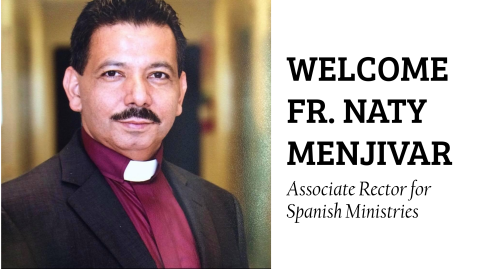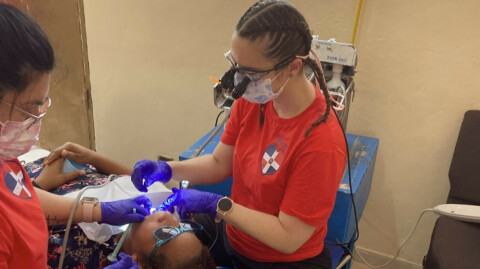TLDR: I love how Saint Dunstan’s develops budgets. All our core values are represented and funded by our Church budget. Please read below to see how.
I finished last week’s blog with the following statement, “In early 2020, Saint Dunstan's called me to operationalize this ambitious set of core values. I was immediately drawn to the work you had already done because I saw the deep biblical wisdom in how your budget and your priorities aligned.” This week I want to start with a brief Bible study and then show you how your core values and your budget align. Ephesians 4:11-12 says, “The gifts he gave were that some would be apostles, some prophets, some evangelists, some pastors and teachers, to equip the saints for the work of ministry, for building up the body of Christ.”
Applying this text to our conversation, we could say that the primary purpose of a church budget is to equip the saints for the work of ministry. Yet, a few questions merit asking, “Who does the teaching in our churches? Who does the pastoral care? Who makes important decisions? Who creates a budget?” The simple answer is that in many churches these functions are left to the clergy. Anglican theologian John Stott once said, “One of the most crippling ideas to pervade the church over the centuries is that there is a special class of Christians, called “clergy,” who do the ministry, while the rest of the church sits back and lets them do it.” (John Stott, One People, 30). This reminds me of a statement I once read by Sir. John Lawrence, “What does the layman really want? He wants a building which looks like a church; clergy dressed in the way he approves; services of the kind he’s been used to, and to be left alone.”
Yet, Ephesians 4:11-14 makes it very clear that those called (hired) as leaders in our congregations (ordained and lay alike) must equip the saints (other members) for the ministry required for the building up of the body. It is the members who do the actual ministering. These ministries of the body help members achieve maturity of faith in Christ and a deep commitment to Scripture’s call for love of God and love of others. When a budget funds staff positions that take over what the congregation is called to do, they treat members as consumers and not as disciples of Jesus. This always infantilizes the members and weakens the church.
By nature of our baptism all of us have been incorporated into Christ’s priesthood, which means that the Church is not divided between clergy and pew-sitters. The ministry of the Body of Christ depends on all members of the Church. Ephesians tells us that God has given us leadership skills that are different for all of us. Some are called to be apostles, others have the gift of prophesy, evangelism, pastoring, and teaching. This list is by no means exhaustive and it was context- specific to the Church of the first century. Today, we could add communications, management, community organizing, welcoming ministries, mediation, and other gifts to the list. The bottom line conclusion is that God has given congregations everything that is needed for the building of the body and the advancement of God’s kingdom.
Many churches equate success with the size of the team charged with doing what needs to be done to grow the church. We have professionalized ministry to the point that we have turned Christians into the consumers of our services and passive spectators. The real job my staff has at Saint Dunstan’s is to equip all of you for ministry. We train, oversee, schedule, support, resource, and advocate for you, but it is the job of the congregants themselves to do the teaching, pastoral care, flower arranging, ushering, serving as acolytes, reading, serving communion, evangelizing, welcoming, offering hospitality, etc.
One of the things that drew my attention back in 2020 is how Saint Dunstan’s develops budgets. We do not have “Cost Centers” as most churches do, but “Mission Center Budgets” developed by the Mission Centers themselves and not by the Vestry or the Finance Committee. Our job as a Finance Committee is to review the Mission Center budgets and offer suggestions for improved funding, then we use the individual budgets to create a church-wide budget that is approved by Vestry every year. Our mission centers are worship, evangelism, youth, children’s formation, community life, pastoral care, outreach, leadership and support, and campus. What this means is that all our core values are represented and funded (at least in part) by our Church budget.
Core Value Mission Center Budget
Children and youth ministries Youth, Children’s Formation, Leadership and Support
Community Fellowship Community Life, Outreach, Leadership and Support
Christian Formation Leadership and Support, Youth, Children’s Formation
Outreach Outreach, Leadership and Support
Worship Worship, Leadership and Support
Pastoral Care Pastoral Care, Outreach, Leadership and Support
Let me give you an example by using the Outreach Mission Center. Under this mission center we cover our Diocesan Assessment since the Diocese uses this money to aid congregations in need, to provide leadership to missions, to fund mission around our area of the state, etc. We also fund our assistance to Seminary of the Southwest and our Seminarian, our assistance to NAM, Lord of the Streets, Hope Center Houston, Lakota Mission, La Romana Mission (Dominican Republic), Kids Hope, etc. The money going into this Mission Center comes from our annual budget, contributions from Street of Shoppes, and additional donations we receive from parishioners throughout the year.
Our budget at Saint Dunstan’s is truly a budget for mission, to equip the hundreds of members who engage in all forms of ministry. We are a deeply connected congregation and most of our members are involved in at least one ministry: Our children acolyte and do service days and missions; our young adults teach Sunday school, do clean-up days, participate in Vestry and other ministries; our older parishioners do a myriad of ministries in accordance to energy level, desire, and expertise; etc. One of the best things we do in budgeting is to allocate clergy salaries (Rector, Associate Rector, and Curate) across all ministries. You see this under the line “Leadership and Support.” This makes perfect sense since we provide our services to all ministries from worship to pastoral care, and all other ministries in between.
Our cultural change is underway. In 2018 we set out to “make necessary changes to attract families with children and youth to our church.” We then created specific goals for children and youth, hired a Children’s Ministry Coordinator, created a Prayground at the very front of our nave, expanded Children’s Chapel to all 9:00, 9:01, and 11:00 am services, created Sunday school for all children and youth ages 2 to high school, funded a Summer mission and camp for all youth from 6th-12th grades, etc.
We set out to “develop and implement a comprehensive strategy to reach new people and incorporate them into the life of the Church.” Since then, we wrote a grant and obtained funding from the Diocese, matched by a parishioner, to hire a full-time clergy person for ministries to Spanish speakers. We created an array of ministries that include Sunday services at 9:01, monthly spiritual retreats, and potluck suppers for major feasts. This 9:01 service is only a year old and already shows great promise.
We wanted “more opportunities for Christian education and spiritual formation at every age and stage of life.” Since then, we switched service times on Sundays to create a proper “Discipleship Hour” from 10:15 to 11:05 every Sunday. We created a Lectionary Bible Study, an English as a Second Language Class, a Bible Study in Spanish, and a Clergy Musings Bible study in English. All of these studies have augmented our existing two studies, “Listening” and “1:00pm Book Study,” which also meet on Sundays.
We also created “more opportunities for people to form meaningful relationships” through the creation of Mothers of Adult Children (MAC), Second Time Around, Holy Smokes, Street of Shoppes 2.0, etc. We have strengthened “the pastoral response of the church in serving people in need” by creating a more seamless relationship between clergy and pastoral care and revitalizing existing programs. Finally, we have adapted “opportunities provided by the church making them more accessible given the pace and schedule of people’s lives” through livestreaming of services, annual meetings, town halls, weddings, funerals, etc.
Your pledges make all of this possible. You fund our budget for mission. You have placed your tressure where your heart is and we are very grateful.
May our Lord continue to bless you,
Fr. Roman+





